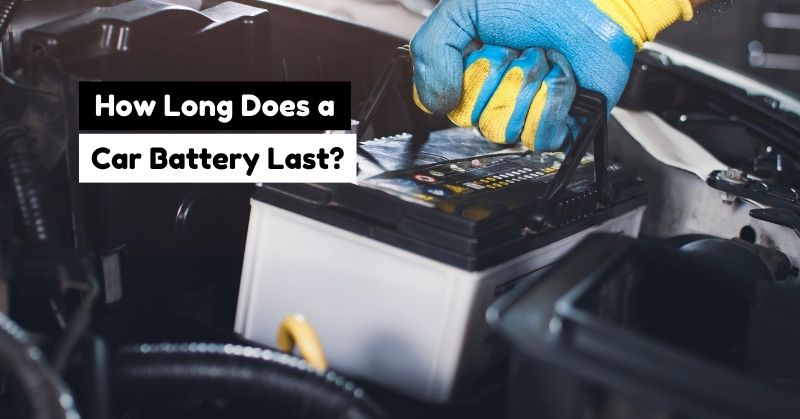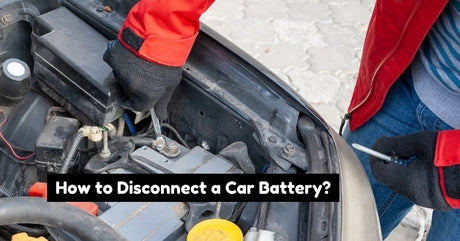A car needs an electrical power supply to run its engine and a range of other components, including but not limited to radio, charging sockets, heater, seat warmers, and AC. A battery delivers the power a vehicle needs to perform all these tasks. Simply put, a battery is the backbone of a car.
Battery age, driving habits, extreme temperature, terminal corrosion, weak alternator, and several other factors affect car battery lifespan. Many people worldwide often search for how long does a car battery last. If you have the same concern, don't miss the discussion below, as it covers everything regarding car battery life.
How long do car batteries last?
There is no definite answer to the question, "how long does a car battery last". The life of a car battery actually depends on various factors, such as care, climate conditions, vehicle type, age, and driving habits. Generally, car batteries last between 3 and 5 years. Some may last for shorter periods, whereas others may last longer if maintained and used correctly.
However, the average car battery lifespan is 3-7 years, depending on different conditions. Extremely cold temperatures may slow down chemical reactions, whereas extremely high temperatures may reduce lifespan and cause faster aging. Similarly, direct exposure to sunlight, shocks, and strong vibrations can damage your battery.

Other factors that affect the actual battery lifespan include depth of discharge, storage environment, number of charge cycles, charge voltage, and charge and discharge rates. The battery lifespan is reduced if you charge it at less voltage than required or store it in a hot or humid place. Similarly, frequent short trips drain more battery and don't allow it to charge fully, which impacts its lifespan.
Signs that you need a new car battery
Now that you are familiar with the average car battery lifespan. It is time to explore the potential signs that indicate when to replace your battery. These signs include slow start, dim headlights, electrical problems, corroded battery terminals, rotten egg smell, and more. Let's explore them one by one.
1. Slow engine crank
If your car struggles to start properly, it might be an indication that you need to replace the battery. The battery capacity reduces with time, and at some stage, it fails to deliver the desired amount of power to run the starter motor and crank the engine properly. You may hear a slow cranking sound if your car battery can't provide enough power.
However, you don't need to replace the battery just because it starts the vehicle slowly. It is always better to check the connections, and if they are tightened well, visit a professional technician to get your battery tested before you assume it needs replacement.
2. Flickering headlights
If you notice that your car's headlights are flickering, it can be due to a weak or completely dead battery. A weak car battery cannot maintain a steady light output, as it delivers insufficient power. When you plan to check your battery health, looking for flickering headlights is a common practice.
Before you replace the battery, it is better to explore the causes of flickering headlights. It can be due to loose battery connections, a failing alternator, improperly positioned fuses, broken bulbs, or overload for a partially charged battery. If you have checked all these things, it is for sure that you need an instant battery replacement.
3. Electrical issues
As you know, a battery supplies power to run all the electronic components or gadgets in your vehicle, including the dashboard lights, charging points, radio, heater, seat warmers, and the list continues. The potential electrical issues are bad spark plugs, a faulty ignition switch, a faulty alternator, and blown fuses.
If a battery is weak and can't maintain the desired voltage level, it won't be able to run all components properly. As a result, they malfunction. Moreover, wiring issues include damaged wiring and loose connections. Therefore, if you notice any sort of electrical issues in your car, you might need to replace the existing battery.
4. Corroded terminals
If your battery terminals are corroded, they may indicate that the battery is not functioning properly. However, corrosion on battery terminals does not always mean that you need a new battery for your vehicle. If not cleaned effectively, corrosion can create several issues, such as reduced car battery life, electrical problems, and slow engine cranking.
When the terminals are corroded, they make it difficult for the power to flow through the battery and deliver to the car. It may greatly weaken your vehicle battery, as it significantly decreases the power output. In the worst case, battery terminal corrosion can make the battery not deliver the power required to start the car's engine.
5. Bad smell
If you notice a rotten egg smell coming out of your car's battery, it is an indication that the vehicle needs battery replacement on priority. The bad smell might damage your vehicle and create a fire hazard. Therefore, instant battery replacement becomes necessary in this case.
What shortens car battery life?
Let's now explore the factors that negatively impact the lifespan of your car battery.
- Extreme temperatures: Extremely hot and extremely cold environments reduce the car battery lifespan by speeding up and slowing down chemical reactions, respectively. As a result, the battery's voltage output and capacity are reduced, and hence it can't last longer.
- Frequent short trips: If you get your car out of the garage for routine tasks every now and then, the alternator might not get enough time to charge the battery fully, and it always remains undercharged. It can damage the cells and reduce the lifecycle.
- Old age: With time, the battery loses its ability to hold a charge and becomes less effective, reducing its lifespan.
- Corrosion: If the battery terminals are corroded, the electrolytes and electrodes within the battery may be damaged, shortening the battery's lifespan. In addition, corrosion on the terminals may also cause the car battery to lose charge more quickly than usual.
- Electrical system problems: Wrong charging habits, fast charging, and using a non-original adapter may cause several electrical issues. They speed up the discharge rate and increase heat, reducing the battery lifespan.
Car battery maintenance tips
Below we have listed some valuable tips to maintain your vehicle properly and keep its battery charged and healthy for maximized performance and enhanced lifespan.
- Keep the battery clean: Ensure to keep your battery and terminals clean. If the terminals are corroded, you can apply a mixture of baking soda and water to instantly remove corrosion.
- Avoid extreme temperatures: Avoid driving in extremely cold or extremely hot environments because freezing temperatures slow down the chemical reactions, whereas extreme heat may cause the battery to overheat and burst in the worst cases.
- Minimize short trips: To keep your car battery well maintained, be sure to minimize the short trips. It will allow the alternator to charge the battery fully, make it last longer, and keep it healthy.
- Use a float mode charger: These battery chargers maintain your battery at a constant voltage level once it is fully charged. These devices are perfect for keeping your batteries away from overcharging. They also protect the electrolyte from boiling out.
- Perform maintenance regularly: To ensure a smooth drive, don't forget to perform maintenance twice a year. It will help you keep a check on the overall performance of your vehicle.
- Secure your battery: Use approved clamps to protect your battery from vibrations and damaging its internal components.
Conclusion
The average car battery lifespan is between 3-5 years. Some batteries can last for more time if maintained properly and used effectively. The factors like climate, temperature, and driving habits have a huge impact on battery performance.
To keep an eye on your car battery health, ensure to perform regular checkups and replace it as and when needed. If you need long-lasting car batteries, don't forget to explore the biggest battery collection at Renogy.
Frequently asked questions
What drains a car battery when the car is off?
The electrical components that continue to draw power even when the car is off include radio presets, faulty wiring, security system, clock, charging points, interior lights left on, and more. They are also known as parasitic draws.
How do I check if my car battery is good?
You can see if your car's headlights are bright, battery terminals are corrosion-free, and listen to a strong crank while starting your vehicle. Using a digital voltmeter is the best method to check if your car battery is healthy. A battery in good health should have voltage levels between 12.6V and 12.8V.
Is there a warning before your car battery dies?
Yes, you can see multiple warnings before your car battery dies. They include a slow engine crank, a battery warning light on the dashboard, electrical issues, dim headlights, and a swollen case.










